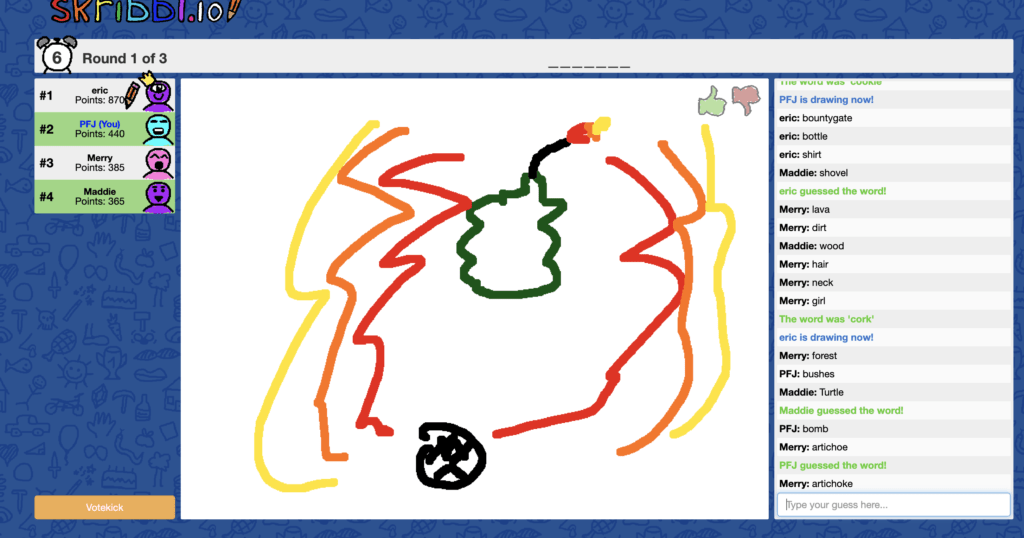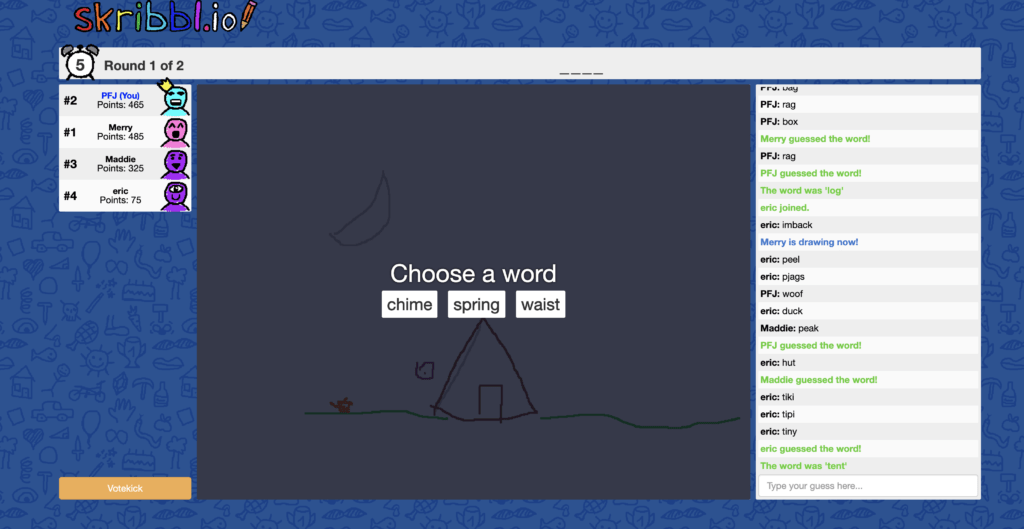This week, I played the judging game skribbl.io, which is a digital web app game created by Twitter user ticedev. There doesn’t appear to be a dedicated target audience; the game’s bright colors and child-friendly content make it appealing to young ages, and its simplicity allows my mother to enjoy the game as much as anyone in the family.
At its core, skribbl.io is most similar to Pictionary; both games require a player to draw a word such that others can identify the prompt. However, while Pictionary is typically played in teams, skribbl.io is multiplayer—at any given time, one player is drawing and every other player in the game is trying to guess the word. The game supports up to 12 players, with it being easy to create a private room to play with friends or hop into a random lobby alongside strangers.
In one round, every player gets a chance to draw and spends others’ turns guessing the words of opponents. When it’s your turn to draw, you getthree words to choose from, and select one to draw; that is the word that you depict on the canvas to try to clue other players into guessing. When someone else is drawing, a text box provides the space to type potential answers, and if you guess the word correctly, you are notified and done guessing for that turn.

skribbl.io’s main types of fun are expression, fellowship, and abnegation. The creative opportunity when drawing highlights expression (particularly with words such as “spring,” that could refer to a season, an object, or a verb), and even when opponents are drawing, thinking about how you might have approached the artistic perspective helps inform quick guessing. Playing with friends and family helps facilitate fellowship fun—it’s entertaining to see very good or very bad drawings, and watch someone fail to guess repeatedly—and the game’s quick pace combined with abstract content allows it to fulfill abnegation. In a reasonably-sized game with engaged players, it meets all of these criteria well; in a more chaotic setting with strangers, it’s possible that wouldn’t exist to quite the same efficacy.

skribbl.io works because of how straightforward it is—everyone knows how to draw, the words are simple, and it moves at a brisk tempo (one very savvy design decision is lowering the clock to guess as players submit correct answers) to keep players engaged. The main improvements I would make surround quality of life and game balance, since the current form doesn’t necessarily result in “good” play winning and thus limits the amount of competitive fun the game can have. On the quality of life front, I’d love to see an undo button as a drawer and a scoreboard that adjusts upward/downward based on place. On the competitive front, the scoring seems skewed toward guessers (if you’re winning late in the game and it’s your turn to draw, the optimal play is sometimes to actually not draw at all, since it allows opponents to come back). The “spam” limit is extremely generous as well, and having some cooldown on guess frequency would prevent the no-downside tactic of spamming potential answers. Lastly, a drawing multiplier or some incentive for choosing more difficult words might make the game more interesting. As a drawer, my motivations leans towardchoosing something comically easy (e.g. “red,” where I can simply paint the whole canvas that color) over a word that would be both more interesting to draw and guess. Given there are already three options presented prior to drawing, giving an easy, medium, and hard word with corresponding multipliers might be one approach to accommodate for this issue.
You do not need to get vulnerable at all in skribbl.io if you don’t like to. Since you can select the words you draw, avoiding any personal landmines is no problem, and guessing requires only submitting a word or two at a time.


